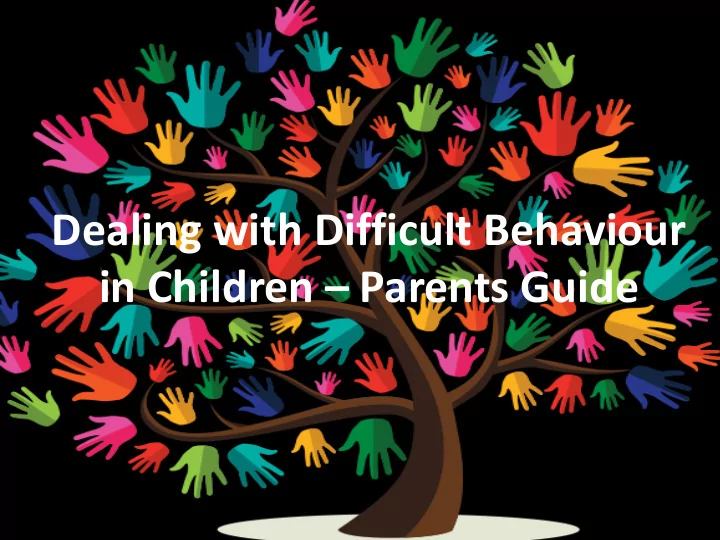

Dealing with Difficult Behaviour in Children – Parents Guide
Introduction Sandwell School Nurses are based at the Lyng Centre in West Bromwich. We offer guidance to school aged children in Sandwell, support their health and wellbeing and provide health education for all schools in Sandwell. This is a guide to help parents understand the different types of behaviours that your child may demonstrate.
Things that affect your Child’s Behaviour • Changes in a child's life can be difficult. This could be due to; bereavement, birth of a new baby, moving house, a change of childminder, or starting school. • Children are quick to notice if parents are feeling upset, or there are problems in the family. They may behave badly when you feel least able to cope. If you're having problems don't blame yourself, but don't blame your child either. • Your child may react in a particular way because of how you've handled a problem in the past. For example, if you've given your child sweets to keep them quiet at the shops, they may expect sweets every time you go there. • Your child might see a tantrum as a way of getting attention, even if it's bad attention. They may wake up at night because they want a cuddle or some company. Try to give them more attention when they're behaving well and less when they're being difficult.
You may notice that the way your child is feeling will affect their behaviour. Children can often display difficult to manage behaviours when they are sad, excited, confused, tired and cannot understand a situation that they are in.
5 Steps to Using Consequences to Reduce Difficult Behaviour 1) Tell your child what they are doing, make it clear that you do not like what they are doing. 2) Give a warning, make it clear that they should stop what they are doing, but try not to shout. 3) Give a consequence, for example they may lose television time. 4) Ensure to explain why you feel this way and why you are giving the consequence. 5) Maintain positive communication, always try to end on a positive, use rewards and reward charts. Rewards do not need to be expensive, it can be as simple as a sticker on a chart, choosing what to have for dinner or watching a favourite programme on TV.
How to handle Difficult Behaviour! • What you do has to be right for your child, yourself and the family. If you do something you don't believe in or that you don't feel is right, it probably won't work. Children notice when you don't mean what you're saying. • Why is it important to not give up? • Once you've decided to do something, continue to do it. Always have boundaries. • Why is it important to be consistent? • If you react to your child's behaviour in one way one day and a different way the next, it's confusing for them. It's also important that everyone close to your child deals with their behaviour in the same way.
How to handle Difficult Behaviour! • Try not to overreact • When your child’s behaviour can be continuously challenging, your anger and frustration can build up. • Try to stay calm and be firm. Move on to other things you can both enjoy and use distraction techniques. • Speak to family, or friends to offload. • Talk to your child • It can help if they understand why you want them to do something. For example, explain why you want them to hold your hand while crossing the road, children need to be reminded of boundaries. • Encourage them to explain why they're angry or upset. This will help them feel less frustrated.
How to handle Difficult Behaviour! • How can being positive affect your child’s behaviour? • When a child's behaviour is difficult, the things they do well can be overlooked. If your child behaves well, tell them how pleased you are. Say something like, "Well done for putting your toys back in the box when I asked you to .“ • What kind of rewards could you offer? • You can help your child by rewarding them for behaving well. Praise your child when you're pleased about something they've done. For example, giving extra playtime. Use reward charts to help improve their behaviour.
If you need further support: Don't feel you have to cope alone. If you're struggling with your child's behaviour, you can get support from: The Sandwell School Nursing Service : 0121 612 2974 Your family General Practitioner (GP) Sandwell BEAM: they offer an emotional health and well-being service for young people aged 5-18 years. https://www.childrenssociety.org.uk/beam/sandwell
Recommend
More recommend